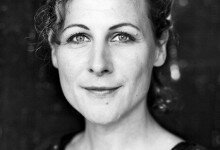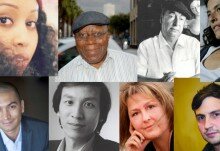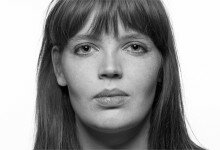"A well of milk in the middle of a city"
Poet Meir Wieseltier edited the complete volume of Hezy Leskly’s poetry that was published in 2009, 15 years after Lesky’s death. When it appeared, Wieseltier was interviewed by Haaretz writer Maya Sela.
The title of the anthology, he told Haaretz, comes from an ars poetic line that questions what poetry can do. A range of possibilities is offered, “but it prefers/ to discover/ a well of milk in the middle of a city.” According to Wieseltier, “If Hezy were to have published a book of all his poems, he wouldn’t have called it ‘The complete poems of Hezy Leskly,’ but would have invented a title. I couldn’t invent anything for him, so I looked for a line of his that would give, at least to my ears, the correct tone.”
While the four books published in his lifetime did not sell many copies, they quickly sold out after his death in 1994. “There was only one edition of each book, perhaps a thousand copies each,” Wieseltier said. “There were no books in the stores, and young people who wanted to read his work, if they had heard his name, had to try used book stores. They might find a copy, but there weren’t many.”
Wieseltier had edited Leskly’s first two books at Am Oved, where he then served as poetry editor. At that time, the publishing house granted a prize for a first book of poetry. “Hezy won it, but the manuscript simply lay there. I had just taken on the job of poetry editor; I edited the book and we became friends.”
[…]
Leskly bequeathed all his belongings, including the rights to his books, to the artist Maya Gordon, a close friend from his days in Holland. “But she lives in Amsterdam and doesn’t know how to publish books,” Wieseltier said. After her attempts to bring out a collection failed, she turned to Wieseltier. “It came to light that Asher Bitan [the publisher that had taken on Leskly when he left Am Oved] had two manuscripts, but he was going bankrupt. The situation was very peculiar. Bitan still hoped to resuscitate his business, and didn’t want to relinquish Leskly’s manuscripts; he agreed to do so but didn’t follow through. Every time we talked and came to an understanding, I would send it to him [to sign] and then there would be silence for six months. It took a lot of time, and nothing could be done while the rights were in his hands. In the end, I asked Am Oved to step in and they helped to obtain the rights.”
Asked why he includes Leskly among the ten best poets in Israel since the founding of the state,” Wieseltier says, “Hezy was the only Israeli poet to come to poetry from a different field of art. This is a big advantage. Reading and learning have changed enormously over the last two decades and to a certain extent Hezy was one of the poets most suited to the new ways. He came from the plastic arts, created installations, was involved in dance as a critic and a choreographer; he understood dance in a profound and intriguing way. All of this is expressed in his poetry. The plasticity of the verbal images he produced is very different, very good and very interesting. That’s one side.
In addition, he was born into Hebrew, although his parents were Holocaust survivors who did not speak the language well. As a young man he left for Holland to study the plastic arts – nonverbal art – and was attracted there to dance – also nonverbal; in a sense he stepped out of the Hebrew language. He returned to it after several years and this process left a mark on his language. His Hebrew is terrific, but it’s a fact that he traveled along this loop – that he consciously or unconsciously decided to leave, and afterward to return precisely to the dimension of language. When he came back to Israel from Holland, he began to write a lot: not only poetry, but also journalism for the weekly HaIr. He wrote large quantities of texts. His language is intriguing – not all poets use interesting language; there are interesting poets whose prose is not particularly interesting at all.”
Leskly was also special, according to Wieseltier, in his approach to homosexuality. “He was a homosexual poet. He did not hint; he was completely open about it; he loathed people who remained in the closet. This is present in many poems and is expressed in the way he grasped many things. On the other hand, he was never a sentimental homosexual, not in life and surely not in his poetry. He didn’t have the tiresome aspects of homosexual thinking.”
And aside from all this, Wieseltier adds, “Hezy was a highly intelligent poet. This can’t be taken for granted. There are poets who aren’t particularly intelligent even though they write good poems. Yehuda Amichai, for example. He didn’t have any very interesting thoughts; he wasn’t especially intelligent. Leskly has poems that are based on brilliant thoughts. POETRY is an ars poetic work that is completely brilliant – not only its wording but the inner structure of the thinking about poetry. He manages to say quite a lot, and you have to think about it in order to understand what he’s saying.”
About Leskly the person, Wieseltier says, “He had a very defined character as a poet, complex but clear. As a human being, there were a lot of contradictions. I knew him from a particular angle. I wasn’t a childhood friend, an old friend. I admired what he did and it was important to him to meet with me now and then; he liked this. We spoke easily with one another. Sometimes there is tension with younger poets; they are on their guard that you might be insulting them, underestimating them, and things like that. He wasn’t like that. He knew I didn’t and that I wanted the best for him.”
About the last two years of his life, when he was sick with AIDS, Wieseltier says, “At first he denied he had the disease. It took a long time for him to admit it to himself. Before he got sick he lied to everyone that he had been tested and was careful. Afterwards it became clear that he hadn’t been careful nor had he been tested. He was afraid of the test; he knew he hadn’t been careful.
Wieseltier feels that Hezy wanted to tell him about his illness, but found it difficult. “In 1992 he suddenly asked to meet me in a strange way. He called and asked if I would eat lunch with him on Saturday, some thing he never did, and we decided on a café. He arrived and I saw that he wanted to tell me something and that he was hardly eating. We sat for about two hours and eat just a bit of his food. I saw he was suffering and that he wanted to talk about something but went around it and didn’t speak. In the end we parted and he hadn’t told me anything.”
A few days later Leskly was hospitalized in a mental institution. “He felt he was going crazy. During the ten days he spent there, I visited him a few times with Alon Altaras and Eli Hirsh. He had begun to speak about AIDS, but we didn’t believe him. He spoke a lot of nonsense and said that he had AIDS the same way people say ‘My shoes are tight.’ He spoke about this but in an unbelievable way. It was his strange way to deal with a sensational announcement.”
Wieseltier believes that at that stage, when the disease had broken out, Leskly considered committing suicide. “He felt he was losing his mind and he couldn’t take it. He didn’t know how to deal with it. When he was calmer and was released from the hospital, no one thought he had AIDS. They thought he had had a mental breakdown. He went home but stopped eating and was hospitalized. He became a skeleton, terribly skinny; he looked terrible, but he did receive the AIDS cocktail. So then it was clear he had the disease, yet his sanity returned. He didn’t really go crazy. He lived for another two years. He improved physically, returned home, and we would visit him and take walks. He liked walking.
He didn’t speak about a fear of dying, but he had it and it paralyzed him. He didn’t write poems during these years. He tried, but couldn’t. All of his poetry was written before 1992. They were two very difficult years. He was in a hospice in his last few months; there he was very stoical. Sometimes he would suddenly cry. It’s natural. An AIDS hospice is a horrible place, although the caregivers were extremely nice and treated him very well, because they saw he was a special person.”
Wieseltier says that a new tradition in Hebrew poetry ends with Leskly and that those who followed him went off in many other directions. “There is ethnic poetry, gender poetry, psychological poetry, all kinds,” he says. “There are talented people but I don’t see a picture, an architecture of what is happening in this poetry.”





